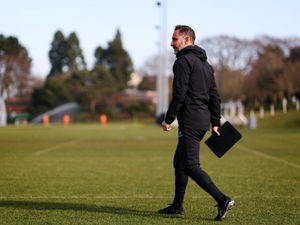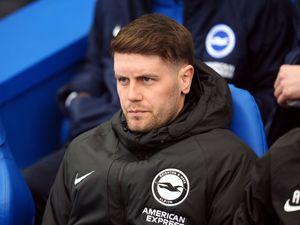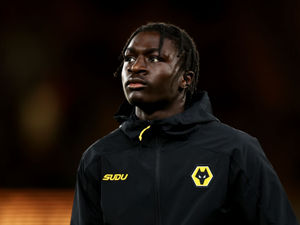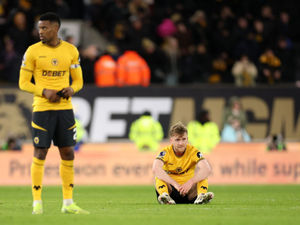Andy Thompson still part of the Wolf pack
It is 25 years since Andy Thompson last kicked a ball for Wolverhampton Wanderers.
Twenty-five years. A quarter of a century.
But he hasn’t gone too far.
His playing career continued elsewhere, but since hanging up his boots he has always remained in the local area, pursuing a new chapter in the teaching profession combined with co-commentary duties for Wolves TV, for which he has just completed his ninth season in the press box.
On the pitch, Thompson’s final Wolves appearance was the 3-1 defeat at Crystal Palace in the first leg of the Championship play-offs in 1997.
He was then dropped for the second leg when a 2-1 win on a night when Molineux shuddered to its foundations thanks to a frenzied level of 90-minute support, sadly wasn’t quite enough.
Talking of not being enough, by that time Sir Jack Hayward had seemingly had enough.
There followed the famous ‘Golden Tit’ interview outlining the owner’s mammoth frustration in bankrolling a squad which – to this day no one seems to know quite why – somehow failed to reach the Promised Land.
After 11 years Thompson rather quietly disappeared off into the distance, rounding off his Wolves days under something of a cloud after falling out with manager Mark McGhee.
But if the manner of his departure was somewhat low key and didn’t hog the headlines, his arrival back in November of 1986 will forever be etched in Molineux folklore.
It is a tale as old as time. And one which, for those of a gold and black persuasion, never grows tired.
A story of how two young men became part of a general exodus up the A41 which saw the club’s fierce local rivals actually pave the way for a remarkable and wonderful Wolves’ revival.
“I was at West Bromwich Albion and had been doing o-k,” Thompson recalls.
“Then the one day I was just walking down the corridor at the Hawthorns before getting ready for training and the manager Ron Saunders walked past.
“He told me that Wolves were in for me, that they’d accepted an offer and that I needed to go and speak to them.
“He didn’t even stop and just carried on walking!
“As a 19-year-old old at the time, I really had no idea what was going on.
“Could I have said no? I was naïve.
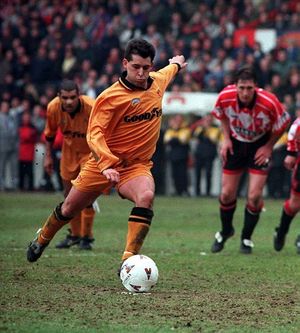
“There was a family friend who used to take me to football because my Mum didn’t drive and I phoned him up to see what he thought and he just said that if Wolves wanted me, and Albion didn’t, maybe I should go.
“It was such a gamble given where the two teams were at the time, Albion towards the top of the then Second Division and Wolves in the middle of the Fourth.
“I knew they were trying to save money at the time, but I was hardly on anything, and it just came as such a surprise to be told I could leave.”
Even more problematic was actually getting over to Molineux for the talks, which was easier said than done.
Thompson didn’t drive, and at the time was travelling from Featherstone to Smethwick via a combination of bus and train.
He needn’t have worried.
Whilst assessing his transport options he was told that someone else had also been given permission to speak to Wolves – and that someone was a certain Stephen George Bull.
And he boasted a bright Orange Ford Cortina, which could merrily chug its way up the A41.
Thompson laughs. “The famous Orange Cortina!
“I got on o-k with Bully at that time but wouldn’t say I knew him too well.
“He would keep himself to himself a lot when he first came onto the scene – he was like Superman running into the shower after training, getting himself dressed and he’d be gone.
“We were chatting in the car on the way across asking each other what we were going to do but I don’t think either of us really knew.
“When we got there, we went in for the talks, met Graham Turner, and it’s difficult to describe but something just felt right.
“Making the move seemed the right thing to do, even though it was such a big gamble at the time given the respective positions of the two clubs.”
A gamble probably doesn’t scratch the surface. Infact, scratch the surface of Molineux at the time and the whole place was probably in danger of falling apart.
The stadium was ramshackle, two sides were shut for safety reasons, there were leaks in the dressing room, cockroaches setting up residence.
And on the pitch wasn’t much better, the club having twice almost gone out of business in previous years and then tumbling unceremoniously from First to Fourth Division in successive seasons.
Cup tied, Thompson and Bull watched from the stands as Wolves were knocked out of the FA Cup, walloped 3-0 by Multipart League Chorley in a second replay at Burnden Park.
Two days earlier they had made their debuts in a 3-0 home defeat against Wrexham. Their next appearance was a trip to Lincoln. Another 3-0 loss. Not the greatest of starts it has to be said.
Gradually though the tide turned. And then, spectacularly so.
The gate inside Molineux for that Wrexham game was 5, 252. Within 18 months crowds had dramatically increased and Wolves took a contingent of 50,000 to Wembley for the Sherpa Van Final against Burnley.
For all the dilapidated and half-shut stadium, as the transformation took hold those players could have turned out on a quagmire on West Park and the fans would have started flooding back.
Build a team and they will come. Fans could relate to the players, they could see the effort and commitment coming back. They fell in love with their club again, it was a special time.
“With those three 3-0 defeats at the start you have to fear the worst,” Thompson recalls.
“Dropping down to the Fourth Division after those relegations and nothing seemed to be going right.
“All of a sudden, for whatever reason, it clicked.
“Maybe Graham was getting his ideas across, shuffling things around, new players were coming in and not just me and Bully.
“Ally Rob (Robertson) was already there, Robbie Dennison came in later, Keith Downing and many others, and everything fell into place.
“The fans needed something, and that was when they started to get right behind the club again after a difficult few years.
“Wolves fans will always get behind a team when they see them giving their all and we wanted to give them something to shout about.”
It wasn’t completely without setbacks as that resurgent Wolves team set about restoring pride and climbing the leagues back in the late Eighties. This is Wolves, after all.
The clicking into gear not long after Thompson’s arrival saw the team finish the 1986/87 season with 15 wins and two draws from their final 19 games, but the late surge had come from well off the pace and wasn’t quite explosive enough to seal automatic promotion.
One of the two defeats came on a Friday night at Southend, who went on to finish third, a point and a place ahead of Wolves whom, in any other previous season, would have landed the final promotion spot in fourth.
But it was the first season of the play-offs and so, 35 years ago, Wolves defeated Colchester to reach a final with an Aldershot side which had finished sixth, nine points adrift of Turner’s team.
What happened next. Well, that was always going to happen, wasn’t it?
“That game at Southend was crucial and effectively turned out to be a promotion decider for third place,” says Thompson.
“Then we got through to face Aldershot and the first leg at their place was played in horrendous conditions, with the pitch waterlogged.
“Obviously it was the same for both teams but we thought the game would be called off with the amount of rain and standing water on the pitch.
“We lost 2-0 and that just gave us too much to do in the second leg and Bobby Barnes scored again at Molineux, so they went through comfortably in the end.
“It was a big disappointment but when you look back maybe it was a blessing in disguise with what happened over the following two seasons.
“We won the Fourth and then Third Divisions and had two trips to Wembley including the Sherpa Van Trophy final win and made some fantastic memories.”
Alongside the quality within the Wolves squad, the balance of wily experience and youthful ambition, the team spirit was unbreakable.
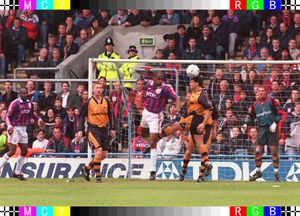
A group of players brought together who got on so well on and off the pitch including the much-famed ‘Tuesday Club’, the lengthy drinking and team bonding sessions which followed a gruelling double training session ahead of a midweek day off.
“Everyone talks about the Tuesday Club a lot and in those days, it certainly worked well for us,” Thompson explains.
“People also talk about team spirit a lot and honestly, we had that so much.
“If we went out it wasn’t just two, three or four of us, it was everyone.
“And when you have that bond off the pitch and are as close as we were it really helps on the pitch as well.
“I know it couldn’t happen like that today but the game was very different and I am sure a lot of clubs did similar!
“Then we had training on the car park on a Friday, something else that was very different but it somehow seemed to help keep us all together.
“In terms of the football, we had a good balance of youth and experience and also a mixture of different kinds of abilities.
“We had the grit we needed to dig in and battle to get results, we had people with technical ability who could get on the ball, and we had people who could score goals.
“It wasn’t just Bully and Mutchy (Andy Mutch) either, Robbie would score, Keith Downing would chip in, Mick Holmes, so many threats.
“There were goals coming from every area and when you have that sort of firepower you are always confident.
“As we went up the divisions, we always fancied ourselves, because of those strengths that we had within the squad.”
That final step, the equivalent from Championship to Premier League, was, throughout the 90s, a bridge too far. Agonisingly so on occasions.
Thompson featured in that Crystal Palace tussle, characterised by customary last gasp drama in his final game with a flurry of late goals, but the one that still rankles, and will probably forever rankle, came against Bolton two years earlier.
“That Bolton game was the one for me,” says Thompson.
“We absolutely battered them at home, it really could have been five or six, but Jason McAteer actually equalised and we only won 2-1.
“Then in the second leg we all saw what happened with John McGinlay punching Ned (David Kelly) and not getting sent off, he scored both goals and we went out.
“I felt sorry for Graham Taylor that night, you couldn’t legislate for that, it just felt like fate wasn’t on our side.
“We all wanted it so much but my biggest regret was not being able to play in the Premier League with Wolves.”
Thompson had actually almost left Wolves during the season before that Bolton play-off as a contract offer was withdrawn, eventually leaving him on week-to-week terms.
And yet, he continued to knuckle down, stayed motivated and performed well enough to actually win the Player of the Season award, and became a key influence again as Taylor took over from Turner.
His highlight of that campaign was the long-range effort he notched in an FA Cup replay at Ipswich, but the vast majority of Thompson’s 45 Wolves goals came from the penalty spot.
He was very much the penalty king of the era - albeit one of his very rare misses came in that memorable shootout win against Sheffield Wednesday - but the secret of his success first emerged prior to joining Wolves.
“When I was at Albion, and I was about 17, I was asked to take a penalty in a shootout in the Full Members Cup against Chelsea,” says Thompson.
“I had only just come into the side, but I did it, and I scored, and from then on, I always felt confident I was going to score every time.
“I missed a few, but that never put me off, and I just seemed to enjoy the pressure that there is on a penalty taker.
“You’re in the spotlight, and it moves very quickly from being a team game to an individual, but I never minded that at all.”
What Thompson also never minded was occupying many different positions.
Arriving as a wide or central midfielder he played in all positions across the park, in both full back positions mainly on the left, and also even up front, reviving memories of junior football with Cresswell Wanderers when he would score 30 goals a season.
Eat your heart out Bully!
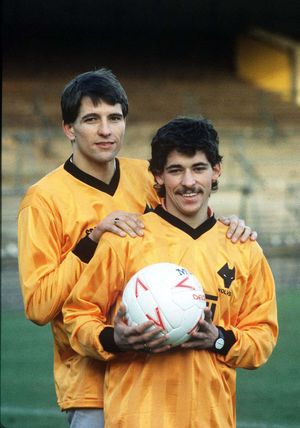
The fans particularly appreciated Thompson for that flexibility and got the chance to pay tribute at his testimonial with a Chelsea side featuring the likes of Frank Leboeuf, Roberto Di Matteo and Mark Hughes in the summer of 1996.
The end, however, was less than a year away.
“It wasn’t nice the way it all finished and being dropped for the second leg of that play-off,” Thompson recalls.
“In the home leg Geoff Thomas was moved to play out of position at left back and I was left out.
“I had gone through a bit of a fallout with Mark (McGhee) as a few players had at that time, and the writing was on the wall, I knew what was going to happen.
“Maybe he felt I had been there a bit too long, but sometimes that’s football, and if the manager wants to move you on then you have to go.”
There were still a few miles on the clock for the then 29-year-old, who linked up with ex-Wolves team-mates Kelly and Paul Cook for three years at Tranmere including being on the bench for the League Cup Final before moving on to Cardiff, Shrewsbury and, finally, Hednesford Town.
He had already begun making plans for life after football, initially taking Maths and English GCSE’s and completing an access course whilst still at Shrewsbury just to rekindle his interest in education.
Embarking on a sports studies degree at the University of Wolverhampton, he soon changed it to teacher training, and completed a placement in Coseley after which he landed a role teaching PE at a secondary school in Derby, where he has been for the last 16 years.
“Originally I got back into doing the exams and courses just for myself, because I had been out of education for so long, but really enjoyed it and so the teacher training side of it appealed,” says Thompson.
“Teaching PE is definitely enough for me though, I enjoy doing it but don’t want any other responsibilities within school as I have seen what it does to people – it’s proper hard work!
“Do people at school know I used to play football? I think so, maybe more now than when I first started.
“The staff always did and now I think a lot more of the pupils will google me and find out about my career.
“Usually though, it ends up with them showing me all those dodgy pictures from back in the days when I had that moustache!”
Thompson, now 54, combines his PE teaching with long-standing co-commentary duties alongside Mikey Burrows on Wolves TV, which has also involved something of a journey, from League One to the Premier and playing in Europe.
“It has been something of a rollercoaster but I’ve really enjoyed it and seeing the quality of players coming in under Nuno and Bruno in recent years has been incredible,” he adds.
“Maybe the end to this season was a bit disappointing but it was still a top ten finish for the third time in four years and hopefully the team can carry on making progress next season.”
So, 25 years on from leaving, Thompson is still a Wolves regular, just with a very different role.
It will always be one which brings back the pride of being the 11th highest Wolves appearance-maker after turning out 451 times for his home-town club.
His home-town club where his Grandad, who had moved from Scotland to work in the pits, would take him to midweek Wolves games cheering on the likes of John Richards and Kenny Hibbitt whilst weekends were spent playing at youth level for Albion, who first scouted him as a 13-year-old.
His home-town club where he was deservedly inducted into the Hall of Fame in 2017, and where last year he joined the committee of the Former Players Association to support others who have trod the same path.
And his home-town club where, from that first journey across the Black Country all those years ago, he went on to forge such a strong friendship with his great pal Bull.
Good times all around!
“Bully is just a legend, isn’t he? For all the goals he scored, the way he played, he deserves all the plaudits that he gets.
“As well as being in the same Wolves team I used to go and watch him play for England and we have always stayed great mates.
“We have been on our own different journeys since finishing and even if we don’t see each other as much as we’d like due to other commitments, when we do it’s like we had seen each other yesterday.
“We still talk regularly, we’ve known each other for donkeys now and nothing will ever change with us.
“That’s just one part of my Wolves story which is one I am really proud of.
“The Hall of Fame was a particularly proud night for me, being there with my family, and joining so many club legends.
“It’s always nice to be remembered, hopefully in a good way by fans and hopefully as someone who tried to get Wolves higher up the divisions.
“Above all else every time I went on the pitch, I tried to do my best, and when you think about it, I think that’s the main thing, isn’t it?”
It is indeed. There’s only one Thommo.

